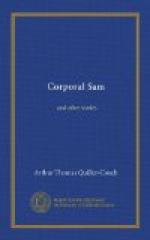So the waiter’s verdict, after all, sounded much the same as Miss Lapenotiere’s. And the conclusion seems to be that you can not only say the same thing in different ways, but quite different things in identical words.
DOCTOR UNONIUS.
CHAPTER I.
’In all his life he never engaged in a law suit. Reader, try if you can go so far and be so good a man.’
Thus concludes the epitaph of Doctor Unonius, upon a modest stone in the churchyard of Polpeor, in Cornwall, of which parish he was, during his life, the general friend, as his scientific reputation now abides its boast.
To those who knew him in life there is a gentle irony in the thought that while, during life, his scientific attainments earned him nothing but neglect, their recognition grows now proportionately as the man himself, his face and habit, the spruce black suit he wore, and the thousand small acts of kindness he did, fade out of memory. ’Your late eminent fellow-parishioner, now these forty years with God,’—so the Bishop of the Diocese spoke the other day before unveiling a stained-glass window to that memory in Polpeor Church. The Bishop, you see, spoke of eternal life in terms of time—a habit with us all. If anything could be more certain than that, in whatever bliss Doctor Unonius now inherits, forty years—or a thousand for that matter—count as one day, it is that throughout his life he detested stained-glass. Through this very window, indeed, now obscured ad majorem gloriam Dei et in memoriam Johannis Unonii medicinae doctoris, he loved—for it faced his pew—to watch during sermon-time the blue sky, the clouds, the rooks at their business in the churchyard elms. He has even recorded (in an essay on ‘Visions’ read before the Tregantick Literary and Scientific Society in the winter session of 1856) that once, awaking with a start in the middle of Parson Grylls’s sermon, he distinctly saw suspended in these same elm-tops the image of an abnormally long pilot-fish (naucretes ductor) he had received from a fishing-boat overnight and left at home in his surgery mounted upon an apparatus of his own invention, ready to be sketched before dissection. Piscium et summa genus haesit ulmo . . . for twenty seconds, rubbing his eyes, he stared at the apparition as it very slowly faded.
It is on his researches in ichthyology, his list (no short one) of discoveries, his patient classification of British Fishes, that his fame rests. ‘Why “British"?’ the reader may ask. ’Have fishes, then, our nationalities?’ The doctor liked to think so. He was a lover of his country, and for three years, while Napoleon threatened us with invasion, he had served as a second-lieutenant in that famous company, the East and West Looe Volunteer Artillery, better known as the Looe Die-hards. Now, in times of peace, with Britain supreme upon




